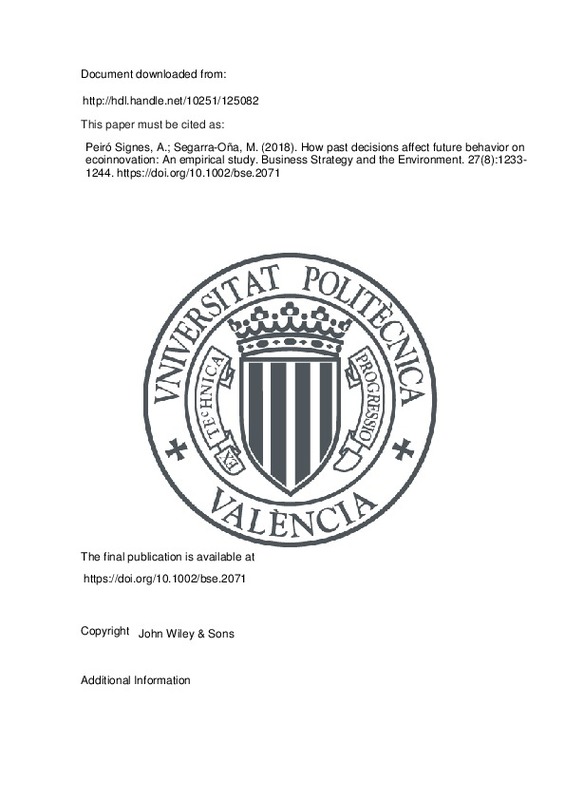JavaScript is disabled for your browser. Some features of this site may not work without it.
Buscar en RiuNet
Listar
Mi cuenta
Estadísticas
Ayuda RiuNet
Admin. UPV
How past decisions affect future behavior on ecoinnovation: An empirical study
Mostrar el registro sencillo del ítem
Ficheros en el ítem
| dc.contributor.author | Peiró Signes, Angel
|
es_ES |
| dc.contributor.author | Segarra-Oña, Marival
|
es_ES |
| dc.date.accessioned | 2019-09-05T20:03:40Z | |
| dc.date.available | 2019-09-05T20:03:40Z | |
| dc.date.issued | 2018 | es_ES |
| dc.identifier.issn | 0964-4733 | es_ES |
| dc.identifier.uri | http://hdl.handle.net/10251/125082 | |
| dc.description | This is the peer reviewed version of the following article: Peiró Signes, Angel, Segarra-Oña, Marival. (2018). How past decisions affect future behavior on ecoinnovation: An empirical study.Business Strategy and the Environment, 27, 8, 1233-1244. DOI: 10.1002/bse.2071, which has been published in final form at https://doi.org/10.1002/bse.2071. This article may be used for non-commercial purposes in accordance with Wiley Terms and Conditions for Self-Archiving | |
| dc.description.abstract | [EN] The environment is increasingly gaining importance for citizens and society and, therefore, for consumers. Eco-innovation is a direct path for reducing the impact of production while providing companies with a source of competitive advantage. The automotive industry and its supply chain have a great impact on the environment, but no research has been developed on how the orientation toward the environment is evolving for the automotive industry and how future performance may be affected by current decisions. The aim of this paper is to bridge this gap by analyzing the eco-innovative dynamism of the automobile industry. To do this, we use a panel analysis to see the point at which past behavior influences future decisions. The partial least square method is used to analyze the eco-innovative dynamism of the automobile industry. We analyze a data set based on 159 responses of Spanish companies that belong to the automobile sector. Results show that environmental orientation drivers do not evolve over a short period while in the longer term there is an evolution. We prove that carryover effects have a great impact on the future behavior of the firms, showing that the evolution of organizations' environmental behavior is a long-range consideration. Managerial implications arise from this paper's conclusions, as the decision-making process is clarified. | es_ES |
| dc.language | Inglés | es_ES |
| dc.publisher | John Wiley & Sons | es_ES |
| dc.relation.ispartof | Business Strategy and the Environment | es_ES |
| dc.rights | Reserva de todos los derechos | es_ES |
| dc.subject | Automobile industry | es_ES |
| dc.subject | Dynamism | es_ES |
| dc.subject | Eco-innovation | es_ES |
| dc.subject | Predicting green behavior | es_ES |
| dc.subject.classification | ORGANIZACION DE EMPRESAS | es_ES |
| dc.title | How past decisions affect future behavior on ecoinnovation: An empirical study | es_ES |
| dc.type | Artículo | es_ES |
| dc.identifier.doi | 10.1002/bse.2071 | es_ES |
| dc.relation.projectID | info:eu-repo/grantAgreement/UPV//PAID-06-2011-1879/ | es_ES |
| dc.rights.accessRights | Abierto | es_ES |
| dc.contributor.affiliation | Universitat Politècnica de València. Departamento de Organización de Empresas - Departament d'Organització d'Empreses | es_ES |
| dc.description.bibliographicCitation | Peiró Signes, A.; Segarra-Oña, M. (2018). How past decisions affect future behavior on ecoinnovation: An empirical study. Business Strategy and the Environment. 27(8):1233-1244. https://doi.org/10.1002/bse.2071 | es_ES |
| dc.description.accrualMethod | S | es_ES |
| dc.relation.publisherversion | https://doi.org/10.1002/bse.2071 | es_ES |
| dc.description.upvformatpinicio | 1233 | es_ES |
| dc.description.upvformatpfin | 1244 | es_ES |
| dc.type.version | info:eu-repo/semantics/publishedVersion | es_ES |
| dc.description.volume | 27 | es_ES |
| dc.description.issue | 8 | es_ES |
| dc.relation.pasarela | S\362057 | es_ES |
| dc.contributor.funder | Universitat Politècnica de València | es_ES |







![[Cerrado]](/themes/UPV/images/candado.png)

